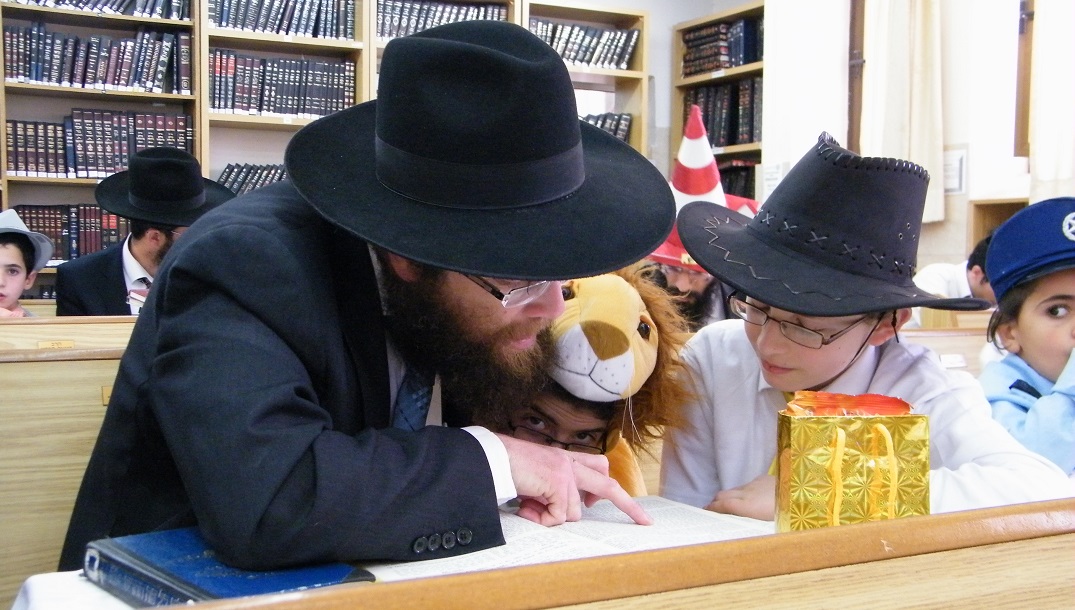Fathers and Sons


Avos U’banim. Fathers and sons.
As we change the clock and another season of father-son learning winds down, some words of appreciation for the program.
Maybe it’s just me, but 45 minutes is a long time to learn with a nine-year-old. There were years when I had more than one son in that age bracket, and we split the time, but this year, it was just me and a sweet nine-year-old with eager eyes and several parshah sheets.
We tried. We filled them in and chazzered the Mishnayos and Chumash. We filled 15 minutes, 20 tops, even with our coming a bit late and looking for parking.
Without the benefit of any rebbi-training seminars, I reached into my reservoir of chinuch creativity and came up with new ideas. When we were kids, there was something called Chumash baseball, and my son was excited by its name, but the actual game proved disappointing. Also, it really only worked with the old blue Chumashim with the thick yellow paper.
We may or may not have played hangman, even though it earned me dirty looks from the person down the row who was laboring through his son’s worksheets and clearly didn’t feel our game qualified as learning.
But of course, he was wrong. The mystery word had to appear in the parshah! And also, my son learned the depth of his father’s love from the fact that as he was about to lose, I added peyos, a yarmulke, and a necktie to the sad little hanging figure. According to a simple formula, in which I added more body parts and accessories than letters in the alef-beis, he won every time. That’s also chinuch — it builds self-confidence.
But over the last few weeks, with the approach of Purim, I found something else to do.
We embarked on an intense hashkafah sugya called Why the Rich Kid Is Going to Win the Raffle. That’s part one. Part two is entitled, Why You (who is desperate for the Hot Wheels Track Builder) Won’t.
Early on, I went with “You never really know, maybe he needs that toy more than you do.” Then my son told me about his rich friend who won a Turbo Slingshock and left it in the trunk of his father’s car for months, so I switched to, “Maybe it’s because it’s not good for you to have it,” which is admittedly very lame.
Now Purim is coming, and maybe we can reexamine the “why rich kids win every raffle” thing.
On Purim, we are dazzled by the accuracy and precision of the drawing, newly aware that everyone’s fate determines his own lottery and his own prize. We run away from reasons because we now understand that we don’t need to know reasons. The One pulling tickets from the hat has reasons and that itself is the cause of rejoicing.
Marbim b’simchah means getting more in touch with the fact that wherever we are, that’s where we’re meant to be. Whatever we have, that’s what we’re meant to have.
It means understanding that just by being who we are, we’ve already won the grand prize. Because in a world of more than seven billion people, we were chosen to be part of that less-than-one percent. And from among those chosen few, we won again — we were given the gift of knowledge, of understanding who we are and what that entails, the handful of people who get to say Shema Yisrael and wear tefillin and light Shabbos candles and carry out the purpose of Creation all day, every day.
In the chinuch community, there is disagreement as to whether Avos U’banim is the best choice of a name for the worldwide Motzaei Shabbos learning program, since it can be hurtful to those banim who don’t have the opportunity to learn with their avos, learning instead with kind neighbors, uncles, or rebbeim. Out of sensitivity, some communities have started to call it Dor Lador.
I’m far from qualified to offer an opinion — but I can share an observation about the traditional name.
If you Google “fathers and sons,” you’ll get postcard-style pictures of muscular dads tossing baseballs to backward-capped sons, an image meant to capture the beauty of the relationship.
It’s takeh very sweet.
But for us, the phrase “Fathers and Sons” refers to a learning program!
One of the things morahs love to do is give out sheets to their charges inducing them to spill the beans about what really goes on at home, with questions such as “What is your father’s favorite thing to do?” and “What do you talk about at the Shabbos table?” (It’s a matter of time until they’re straight-up asking “Do you feel like your parents are doing a good job?” and don’t say I didn’t warn you. Information is being collected by someone, somewhere, and he’ll probably sell it to seminary interviewers and shadchanim at some point.)
This weekly program and its name is the truest answer to that question and all such invasive questions: fathers and son learn. It may not always work out — fathers sometimes get busy and kids sometimes get kvetchy (or vice versa), and they might also play ball, but the essential connection between avos and their banim is formed by learning Torah together.
The default setting for the relationship is the picture of two people seated across the table from each other with open seforim. By us, that’s what fathers and sons have always done, how they forged their own relationships, all the way back to Har Sinai. Look at paintings from a hundred years ago and you’ll see the same thing: wise-eyed fathers, eager sons, and worn seforim.
And maybe, just maybe, hidden under the sefer, there was a paper and some blank spaces and a half-filled in word from the parshah.
Originally featured in Mishpacha, Issue 752. Yisroel Besser may be contacted directly at besser@mishpacha.com
Oops! We could not locate your form.


